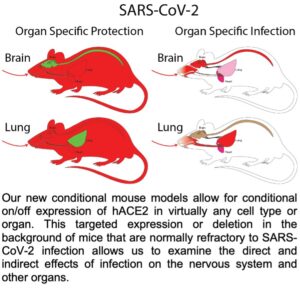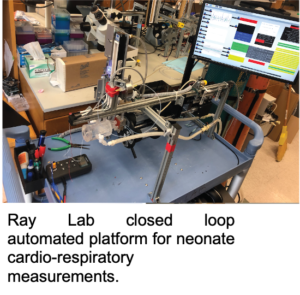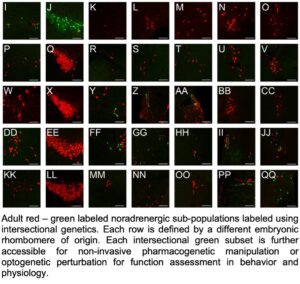Three funded postdoctoral positions are immediately available in the Ray lab at Baylor College of Medicine in Houston Texas.
Our laboratory studies the molecular and genetic events that organize brainstem neural circuits important in physiology and behavior. Our multidisciplinary approach uses a variety of genetic, molecular and viral techniques to target highly specific brainstem cell types for functional, molecular and anatomical study. Our goal is to identify key populations that may play a role in pathophysiologies, behavioral disorders, and neurodegenerative diseases.
Please respond with a cover letter including a description of work experience, C.V., and contact information for two references to:
Russell Ray, Ph.D.
Email: russell.ray@bcm.edu
Ray Lab Website: http://www.molecularneurobiology.org
BCM Website: https://www.bcm.edu/russell-ray-29268
COVID-19 Postdoctoral Fellowship at Baylor College of Medicine
An immediate opening for a post-doctoral fellowship to study the direct and indirect effects of SARS-CoV-2 infection on the nervous system is available in the Ray lab at Baylor College of Medicine in Houston, Texas (molecularneurobiology.org). Our laboratory takes a multidisciplinary approach using a variety of genetic, molecular, and viral techniques to target highly specific brainstem cell types for functional, molecular, and anatomical study in physiology, behavior, and disease.
This position will head an effort to use a series of humanized conditional on/off hACE2 expressing mouse models engineered in the Ray lab that are able to either 1) direct SARS-CoV-2 infection to a specific organ or cell type while leaving the remaining mouse uninfected, or conversely; 2) protect a specific organ or cell type in background of a whole body systemic SARS-CoV-2 infection. Mouse models will be assayed for cardio-respiratory function using a novel BSL-3 cardio-respiratory and metabolic measurement system and for behavior in both acute and recovery phases of infection (i.e. Long COVID).
 The candidate should have a doctoral degree, strong research background, and initiative to lead projects. The ideal candidate would have experience in BLS3 animal studies. Experience in respiratory physiology, genetic mouse models, as well as statistical knowledge sufficient for handling datasets and addressing different variance components will also be helpful. However, highly motivated applicants with a successful and productive research track-record will be trained as needed for this project.
The candidate should have a doctoral degree, strong research background, and initiative to lead projects. The ideal candidate would have experience in BLS3 animal studies. Experience in respiratory physiology, genetic mouse models, as well as statistical knowledge sufficient for handling datasets and addressing different variance components will also be helpful. However, highly motivated applicants with a successful and productive research track-record will be trained as needed for this project.
Additionally, our laboratory is active in the development of new tools for improved access and study of neural circuits and thus offers several training opportunities in mouse genetic model generation (including CRISPR/Cas9 techniques) and development of novel viral vectors, as well as a variety of animal physiology and behavioral assays.
Baylor College of Medicine offers an outstanding research environment at the Texas Medical Center with more than 50 non-profit institutions which offers one of the highest densities of clinical, translational, and basic science research facilities in the world. BCM and the Ray lab are equal opportunity employers committed to building a culturally diverse intellectual community and encourage applications from women and minorities.
SIDS Genetic Screen Postdoctoral Fellowship at Baylor College of Medicine
An immediate opening for an NIH post-doctoral fellowship (R01HL130249) to study genetic mechanisms in Sudden Infant Death Syndrome is available in the Ray lab at Baylor College of Medicine in Houston, Texas (molecularneurobiology.org). Our Laboratory takes a multidisciplinary approach using a variety of genetic, molecular, and viral techniques to target highly specific brainstem cell types for functional, molecular and anatomical study in physiology, behavior, and disease.
This position will head an effort to carry out a first of its kind genetic screen to identify genes that are required for neuro-developmental and cellular processes critical to protective neonate respiratory reflexes that may be perturbed in Sudden Infant Death Syndrome (SIDS) and other congenital respiratory pathophysiologies. To that end, we are in a unique position to leverage the Baylor College of Medicine (BCM) Knockout Mouse Project-2 (KOMP2) effort to knock out or mutate and characterize every gene in the mouse genome. To screen KOMP2 mutants, we will utilize an array of novel and highly innovative closed loop feature detection robotic platforms for automated neonate cardio-respiratory measurements developed in our lab (https://www.youtube.com/watch?v=FiOV1F6fnFA). Successful outcomes will uncover genetic, molecular, and cellular developmental processes critical to neonate cardio-respiratory function that may play a role in congenital pathophysiologies.
 The candidate should have a doctoral degree, strong research background, and initiative to lead projects. The ideal candidate would have experience in respiratory physiology, genetic mouse models, and statistical knowledge sufficient for handling datasets and addressing different variance components for large scale experiments (phenotypic screens). However, highly motivated applicants with a successful and productive research track-record will be trained as needed for this project.
The candidate should have a doctoral degree, strong research background, and initiative to lead projects. The ideal candidate would have experience in respiratory physiology, genetic mouse models, and statistical knowledge sufficient for handling datasets and addressing different variance components for large scale experiments (phenotypic screens). However, highly motivated applicants with a successful and productive research track-record will be trained as needed for this project.
Additionally, our laboratory is active in the development of new tools for improved access and study of neural circuits and thus offers several training opportunities in mouse genetic model generation (including CRISPR/Cas9 techniques) and development of novel viral vectors, as well as a variety of animal physiology and behavioral assays.
Baylor College of Medicine offers an outstanding research environment at the Texas Medical Center with more than 50 non-profit institutions which offers one of the highest densities of clinical, translational, and basic science research facilities in the world. BCM and the Ray lab are equal opportunity employers committed to building a culturally diverse intellectual community and encourage applications from women and minorities.
Respiratory Neurobiology Postdoctoral Fellowship at Baylor College of Medicine
Respiratory Neurobiology Postdoctoral Fellowship at Baylor College of Medicine
An immediate opening for an NIH post-doctoral fellowship (R01HL130249) to study brainstem respiratory circuits is available in the Ray lab at Baylor College of Medicine in Houston Texas. The current focus in the laboratory is functionally mapping the organization of the central noradrenergic system in regulating cardio-respiratory function and its role in pathophysiologies ranging from Sudden Infant Death Syndrome and Rett Syndrome to Sudden Unexpected Death in Epilepsy.
Our laboratory takes a multidisciplinary approach using a variety of genetic, molecular, and viral techniques to target highly specific brainstem cell types for functional, molecular and anatomical study in physiology, behavior, and disease.
 The candidate should have a doctoral degree, strong research background, and initiative to lead projects. The ideal candidate would have experience in respiratory physiology, genetic mouse models, histology and microscopy, and statistical knowledge sufficient for handling large datasets. However, highly motivated applicants with a successful and productive research track-record will be trained as needed for this project.
The candidate should have a doctoral degree, strong research background, and initiative to lead projects. The ideal candidate would have experience in respiratory physiology, genetic mouse models, histology and microscopy, and statistical knowledge sufficient for handling large datasets. However, highly motivated applicants with a successful and productive research track-record will be trained as needed for this project.
Additionally, our laboratory is active in the development of new tools for improved access and study of neural circuits and thus offers several training opportunities in mouse genetic model generation (including CRISPR/Cas9 techniques) and development of novel viral vectors, as well as a variety of animal physiology and behavioral assays.
Baylor College of Medicine offers an outstanding research environment at the Texas Medical Center with more than 50 non-profit institutions that offers one of the highest densities of clinical, translational, and basic science research facilities in the world. BCM and the Ray lab are equal opportunity employers committed to building a culturally diverse intellectual community and encourage applications from women and minorities.
